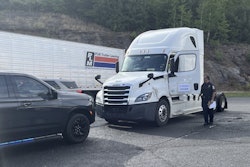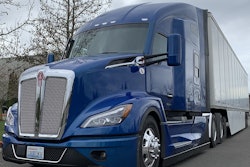Trucking news and briefs for Tuesday, July 15, 2025:
New Indiana towing laws take effect
New laws aimed at cutting down on predatory towing in Indiana took effect July 1. The bill, House Bill 1390, was signed into law by Governor Mike Braun in May.
The bill came to pass after a 2023 report from the American Transportation Research Institute that found the Hoosier State had the most reported predatory towing incidents relative to mileage in the U.S.
The move follows legislation either introduced or codified in several states around the country aimed at preventing abuse of truck owners by bad actors among towing companies, including in Florida, Mississippi, Tennessee, Colorado, Maryland, Virginia and North Carolina.
The bill addresses:
- Police towing rotations
- Fees charged to inspect or retrieve items from a towed vehicle
- Requirements for the release of property to its owner
- Invoice requirements
- When towing companies can charge fees
[Related: 'Predatory' tows' big-dollar impact in trucking at roadside, or at blunt end of the parking shortage]
According to the new law, law enforcement agencies are required to establish a written policy or enter into a contract for a towing company rotation that includes specific information, such as rates for all services and rates for storage; a provision that allows law enforcement to suspend or remove a towing company from the rotation; and a prohibition on charging fees not listed under the written policy or contract, among other items.

Law enforcement is not allowed to use a towing company that charges “unreasonable fees” in its towing rotation.
The new law also bars a towing service or storage yard from charging a fee to a vehicle owner, a lienholder or an insurance company representative to inspect a vehicle or retrieve items from the vehicle.
The law also allows commercial carriers to file complaints with the Indiana Attorney General if they believe towing charges are “unreasonable.” A towing company or storage facility is required to release the impounded vehicle and its cargo within 24 hours of receiving payment of 75% of the invoice, proof of bond for the remaining 25% and a copy of the complaint.
Indiana law already required an itemized invoice of actual towing charges that included the origin and destination of the tow; name, address and phone number of the towing company; a description of the towed vehicle; and other details. Under the new law, fees listed on the invoice now must also include a full description of the services that were provided. Towing companies must also now include on the invoice an attestation that all items invoiced were used and necessary in the ordinary course of business, a good faith estimate of the time that each invoiced item was used and the location, and the number of miles the vehicle was towed.
[Related: Predatory towing: How common it is, and how truckers can avoid it]
North Carolina guv signs predatory towing bill into law
In other news related to towing, North Carolina Governor Josh Stein has signed Senate Bill 311 into law.
The bill, as reported recently, bans the use of boots on commercial trucks for the purposes of parking enforcement. It also aims to prevent companies from holding cargo hostage in efforts to extract outsize fees.
The law is set to take effect on Dec. 1.
[Related: Parking boots on trucks banned by North Carolina legislation]
14 trucks placed out-of-service during one-day blitz in Texas
Commercial Vehicle Enforcement troopers with the Texas Department of Public Safety found 162 violations as part of a one-day inspection operation on State Highway 114 in Denton County on July 10.
During the operation, troopers inspected for mechanical issues, ensured drivers followed hours-of-service rules to prevent fatigue, checked for overloaded and unsecured cargo, and monitored hazardous material transport.
Troopers conducted 42 inspections, resulting in 162 violations for which 157 warnings and 5 citations were issued. Fourteen commercial vehicles were placed OOS for defective brakes, unsecured load, flat or faulty tires, and loose and cracked axle positioning parts.
ZM Trucks unveils new battery-electric terminal tractor for North American market
ZM Trucks North America has officially unveiled its T75 Battery-Electric Terminal Tractor, a zero-emission heavy-duty vehicle (ZEV) purpose-built for America's ports, warehouses, and distribution yards.
The truck made its debut on the show floor at the 2025 Port Electrification Conference, drawing strong interest from fleet operators and sustainability leaders, the company said.
Designed from the ground up as an all-electric platform, not a diesel retrofit, the T75 combines industrial-strength performance with cleaner technology to meet the real-world demands of high-volume yard operations, the company said. With a 75-mile operational range, a GCWR of 165,350 pounds, and an 80,000-pound fifth wheel lifting capacity, the T75 is built for all-day work. Its dual-gun DC fast charging system enables recharging from 20% to 80% in as little as 42 minutes, delivering uptime comparable to diesel trucks while operating much more quietly, the company said. Quiet operation in turn not only reduces noise pollution but contributes to higher driver satisfaction and retention, especially during long shifts.
[Related: What if your trailer could take the load off your diesel?]
"This isn't just a diesel truck with a battery pack," said Joost de Vries, CEO of ZM Trucks. "The T75 was engineered from scratch to be electric, rugged enough for long shifts, smart enough for modern fleet management, and clean enough to meet today's zero-emission goals."
The T75 delivers 415 peak horsepower and up to 2,802 lb.-ft. of torque, providing the strength needed for demanding yard operations. It's built with a complete ABS air brake system, LED exterior lighting, and halogen headlights. Inside the cab, operators benefit from a comprehensive HVAC system, a 10-inch LCD dash, 360-degree cameras, and ergonomic controls designed for comfort during extended shifts.
The tractor's heavy-duty engineering includes a proven chassis platform with optional central lubrication. For off-road duties like dump truck work, an optional hydraulic package to power trailers can be added. Additionally, the company added that the T75 is fleet-ready, featuring a comprehensive telematics package and a robust electrical system that supports high-duty cycles with ease.
The T75 is now in full production and available for order in the United States, Canada, and Mexico.
[Related: Up close with ReVolt Motors' diesel-electric hybrid Peterbilt 379 retrofit]










